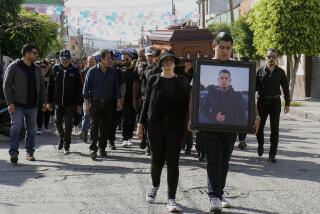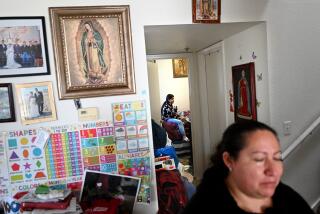Spanish Farmers Cut Off From Future : Murders Viewed as a Symptom of Region’s Stagnation
- Share via
SURRIBAS, Spain — People knew Paulino Fernandez as a reserved, distant man obsessed with his plots of land in this isolated mountain hamlet. One day, the 64-year-old farmer unsheathed the knife he used to slaughter hogs and stabbed six of his neighbors to death.
Then he burned himself to death in his farmhouse.
News of the killings last month caught the attention of all Spain: it had happened in Galicia, an underdeveloped, northwestern region where only 27% of the people live in cities.
“It appears clearly to have been an attack of madness,” historian Ramon Villares Paz said, “yet it’s a paradigmatic incident, a sort of death cry of a rural society of elderly people with a tightly held conviction that their culture has no future.
“Surribas is isolated, like a majority of villages in Galicia, populated mainly by old people with problems of communication between them, without any future, without horizons.”
Celtic Culture Lingers
Galicia is sometimes called Spain’s Ireland because of its Celtic origins. The playing of bagpipes is common here. Each summer, the international Celtic music festival in Ortigueira attracts musicians from all the Celtic regions of Europe. The Celtic cross is a familiar sight throughout Galicia, and a dance called the muneira is similar to the Irish jig.
Galicia is four provinces of verdant, hilly land, geographically cut off from the rest of the country by poor communications and a rugged mountain range around its eastern flank and its southern border with Portugal.
Since prehistoric times, it has been characterized by a social and economic structure not typical of the rest of Spain.
Subsistence farming remains the norm in much of the interior of Galicia today.
And there lived Paulino Fernandez in his farmhouse with his fears.
Analysis of Crimes
“Paulino had been extremely worried about someone taking his land, but he faced no threat of any kind and had normal relations with neighbors,” said Sergio Vazquez Yebra, Fernandez’s lawyer and mayor of the nearby town of Chantada.
The Galician village is “a world subject to drastic transformations,” columnist Carlos Luis Rodriguez wrote in La Voz de Galicia, the region’s leading newspaper.
“The crime . . . is, in part, an expression of the daily dramas of rural Galicia that stun us because they shatter our ideal of the bucolic village.
“The Galician village is a genuine pressure cooker where all kinds of conflicts simmer over a low fire and where the modern and the ancestral crash into each other as if upon a breakwater.
“The peasant who listens to the sermon of the parish priest in the morning and watches ‘Dallas’ on television by the light of the hearth must necessarily suffer a shock due to the sudden clash between a world view proper of the last century with another that is an advance of that to come in the next century.”
Jobs Came and Went
Between 1950 and 1970, the region of 3 million people underwent rapid but incomplete industrialization, mainly involving shipbuilding and steel plants on the Atlantic Coast. Since then, however, more than 20,000 relatively new, high-paying jobs in these smokestack industries were lost, due to drastic restructuring forced by a decade-long recession that ended in 1984.
Galicia accounts for less than 6% of Spain’s gross national product, and agriculture still dominates the economy. Potatoes, corn, grapes and cabbage are the principal crops, and dairies here supply about 25% of the milk consumed by Spain’s 39 million people.
Paulino Fernandez’s obsession with his real estate rang true to the Galicians’ fabled bond with the earth and their legendary longing for the land it after they had emigrated to Latin America or, more recently, to West Germany or France.
An estimated 1 million Galicians, haunted by the specter of a dark future, left home in this century.
Among the best-known products of Galicia are Cuba’s Fidel Castro and Raul Alfonsin, the president of Argentina.
Other Spaniards see Galicians (los Gallegos) as melancholy, brooding and pessimistic people obsessed with death and witchcraft. They are also known for their cunning and their contradictory nature.
More to Read
Sign up for Essential California
The most important California stories and recommendations in your inbox every morning.
You may occasionally receive promotional content from the Los Angeles Times.













